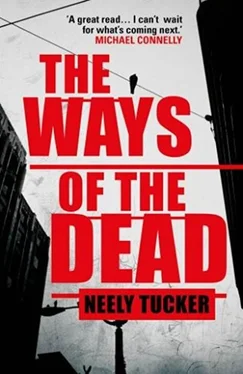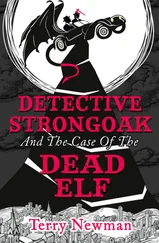“How would I check into other girls, women missing up in that area?”
“Under eighteen, right here, but we can’t tell you shit because they’re underage. Adults, you got to go out to 4-D. But I got to tell you, don’t be looking at the files out there like they’re Scripture.”
“Because?”
“Well, one, I refer to my earlier statement, senator. It’s kind of fucked up. Two, adults have the right to disappear. It’s not a crime not to keep a fixed address, and it’s not against the law to move someplace your momma and them can’t find you. And I’m saying ninety-eight, ninety-nine percent of missing adults are the homeless, vagrants, the mentally ill, your hard-core methies and crackheads. They turn back up in a week or two in McPherson Square, Freedom Plaza, or living beneath an overpass in Brooklyn, or five years later in a homeless shelter in Minneapolis, or they turn up as a toe in the morgue. Not more than a handful are quote-unquote actual missing cases-kidnappings, girls who leave for work and never come home.
“Meanwhile, look at this here. You’re a uniform out there in your district, pulling double shifts, busting your ass? Family calls, brother’s missing, they’re hysterical or they’re pissed or they just feel on obligation. They know he’s fucked up but they call it in because it’s family and what else you gonna do? You catch the case, and this isn’t-you ever see the NCIC form? It’s like thirty fucking pages. Dental records, tattoos, list of surgeries. You wouldn’t believe. So you sit with them, fill out the form, but it’s not even a perp card, right? The guy didn’t do anything. You lose ninety minutes of the only life you’ll ever lead and you send it to us downtown.
“Now, five days later, the asshole turns up living beneath a tarp on Farragut Square. You find out he’s had a crack problem since high school and the family knew it but didn’t tell you because they knew if we knew then we wouldn’t look. They’d be right but it’s bullshit. So you’re pissed the family hustled you, but you got to stop what you’re doing, go erase him from your system, then call us and say, Hey, erase him, then we’ve got to have somebody actually erase him instead of just thinking about it, and if you forget or we forget then the numbers get off, and you can multiply that process by about a million. That’s the files you’re looking at.”
“So you’re saying the Old Testament is more reliable?”
“Don’t get me started on the Bible. Merlie is, what do I want to say, a special friend.”
You had to be kidding. People tell you things like this, this is the way it is, and you still just couldn’t believe.
From a file drawer, the clerk at 4-D had pulled out page after printed page of official police notifications of the missing, the sheets spilling out onto the floor at one point, a sheaf of them. God.
On each sheet, a picture of the individual was centered below MISSING in bold, black type. Their name, their age, and last known location was listed at the bottom, along with an MPD phone number. There were more than a hundred, could have been two. They were in no particular order, and the database was not much more than a computerized mess. Some of the cases were closed out, with marks for “Reunited” or “Dead.”
Some listed the precise date they went missing; others just read “Summer 1998.” Some went back to the late 1980s. One-he took this one-had been filed the week before. Others listed an address for the missing, not the place where they were last seen. It had the surreal look and feel of a fever dream, postcards from a nightmare of America gone wrong.
He stopped at the bulletin board in the front lobby on the way out, another bastion of “Missing” posters, most of these handmade. There were pictures of smiling young women, plump-faced middle-aged men. Nearly all the faces were black, most of the rest Latino, and there were two or three white faces, old, grizzled men who did not look coherent. There were a couple of handbills that he recognized from the files he’d just gone through in the back. He went back to the copies he’d made and turned down an ear of the paper on those, to mark it as someone whose family appeared to be seriously involved.
Jogging across the street to the McDonald’s, he got a Coke and some French fries, went to a booth, pulled out a flask, topped off the Coke with a lace of bourbon from his flask, and settled in.
Six or seven cases immediately appeared to be possibilities. Linda Blackwell, Kellie Meikle, Rebekah Bolin, Andrea Thompson-good god, all these in the past three years, all listing a home address within four or five blocks of Princeton Place? Was anybody paying attention?
He pulled out his cell and started dialing. Blackwell, Meikle, both had answering machines. On Bolin, a woman answered, listened to his spiel, and said abruptly that her daughter was dead.
“Ma’am? I’m terribly sorry to hear that. I-I am. But it would be helpful to me if you could tell me where she was found. I don’t see her on a list of homicides.”
“They found ’Bekah beneath a house on Princeton Place, the 600 block,” she said.
Sully, who had been scribbling notes, stopped.
“Beneath a house?”
“The floorboards. The-what do they call it, the crawl space? It was abandoned.”
“When was this?”
“January, this year. When they found her. She’d been there awhile.”
He looked at the poster.
“It says here-the poster-that she was last seen in June the year before, like seven months prior.”
“That’s right.”
“Was it unusual for you not to see her for that long?”
“I told you she’s dead.”
“Yes’m, I hear you. I’m sorry. But-it sounds like-maybe-it says here she was twenty-three, that maybe she was out a lot.”
“’Bekah had been in the wind since she was seventeen.”
“But-why-why didn’t they call it a homicide? I don’t mean to pry, it’s just-”
“’Bekah had been on the streets since she dropped out. She weighed ninety-three pounds. She had been arrested I don’t know how many times for drugs. She’d come home and I’d have to put her out, send her to her father’s. She’d steal everything.”
“There was a community meeting at the rec center last night, and the police, they didn’t even mention her name as-as a case that might be-”
“They said her death was of ‘undetermined causes.’”
“But she was found beneath the floorboards of an abandoned house.”
“They said to me, they said, Look, she’s been doing crack forever, got busted recently for heroin, likely she got a hot dose, you know, and it likely gave her a heart attack-”
“Likely?”
“-and she died from that. Yeah, likely. What else? I loved my baby. But I ain’t going to sugarcoat what she was.”
He waited, trying to think of something kind, something patient, to say. Nothing came to mind. The lady knew what she knew.
“Okay, like I said, I’m writing about Princeton Place, and some of the things going on up there. Can I get a picture of Rebekah to-?”
“You can use the one on the flier.”
“Thank you. May I ask your name? I never-”
“Pearl. Pearl Bolin.”
“And, just making sure I heard right, you were her mother?”
“I still am.”
He hung up, the whiskey forgotten, his mind tumbling the numbers to a combination lock. Something was off here, something-this many women and he wasn’t even looking hard yet… Where was it, where was it? There it was. Williams. The handbill from the police station, Michelle Williams, the dad from the night before.
He dialed the number on the flier and held his breath, looking at the picture on the handbill, a smiling young woman, plump, pretty.
Читать дальше












